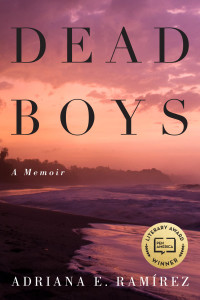
Adriana E. Ramírez
Dead Boys: A Memoir
(Little A, November 2016)
Winner of the inaugural PEN/Fusion Award for Emerging Writers
Seven brave essays about death, healing, and family.
What can we learn from the haunting tragedy of a young boy gunned down by a vengeful loan shark, or from a camouflaged corpse washed up on a beach, or from nine bodies hanging from a bridge? Is it any different than what we can learn from the heartbreaking death of the author’s own brother in a childhood horse-riding accident? Written with brutal honesty and extraordinary respect, Dead Boys announces the debut of a powerful nonfiction writer possessed of striking empathy and strength. In these linked essays, Adriana E. Ramírez examines the universal tragedy of a mother losing a son and gives voice to the grief and experience that is often obscured in media reports of the drugs wars.
By confronting the memory of the dead boys the author has encountered in her life as she’s moved back and forth between Colombia, Mexico, and the United States, Ramírez attempts to make sense of the senseless. Through the author’s unflinching and poetic examination of drug violence, Dead Boys attests to the fragility of life, even while exploring the harsh mechanisms of narco-trafficking.
Praise for Dead Boys
“Adriana E. Ramírez’s Dead Boys is like an extraordinarily distilled correlative to the murdered and disappeared women in Roberto Bolano’s 2666. Like Bolano, Ramírez champions witness, tenacity, and compassion. Combining the meditative clarity of extended essay and the evocative precision of poetry, she has devised a language capable of bearing unbearable loss. She captures the nuances of family memory, cultural memory, and ultimately, of survival. This book is a succinct, lyrical gem.”
—Terrance Hayes, National Book Award-winning author of How to Be Drawn and Lighthead
“Alarmingly intelligent, confident and beautifully delivered, Ramírez’s stories of dead boys are full of righteous rage and a timely urgency. Her powerful and vivid prose, both poetic and brutal, makes the stories unforgettable.”
—Angie Cruz, author of Dominicana, and Let It Rain Coffee
“A master class in writing lyrically, Dead Boys opens with the horror of Ramírez’s brother’s death, and builds outward from there, connecting her family to the larger violence of drug cartels in Mexico, ongoing armed conflict in Colombia, and shootings in the United States. Ramírez is not afraid to go there. Her prose charges and sings as she lingers unapologetically on breathtaking images of a busted-open skull, a rotting corpse, rope burns on the necks of bodies hanging off a bridge–images that haunt and inform this stunning debut. It’s about the dead boys, but just as urgently about the grief of mothers and those left behind. Rather than pushing the reader to make meaning, Ramírez’s intelligent and emotionally sweeping chapters push us to consider the value of a single human life, and the contexts in which it is entangled. DEAD BOYS is that rare accomplishment that puts you under its spell, and doesn’t let go.”
—Jeanne Marie Laskas, New York Times-bestselling author of Concussion
Adriana E. Ramírez is a Mexican-Colombian writer, digital maker, and performance poet based in Pittsburgh. She won the inaugural PEN/Fusion Emerging Writers Prize in 2015 for an early draft of Dead Boys, and in 2016 she was named Critic at Large for the Los Angeles Times Book Section. Her essays and poems have also appeared in the Los Angeles Review of Books, Guernica/PEN America, Convolution, HEArt, Apogee, and on Nerve.com. Once a nationally ranked slam poet, she cofounded the Pittsburgh Poetry Collective and continues to perform on stages around the country. She was recently featured in the 2014 Legends of Poetry Slam Showcase and in TEDxHouston, as well as in the 2016 Three Rivers Arts Festival. In 2013, she and novelist Angie Cruz founded Aster(ix) Journal, a literary journal giving voice to the censored and the marginalized. She is a member of the English faculty at the University of Pittsburgh.
